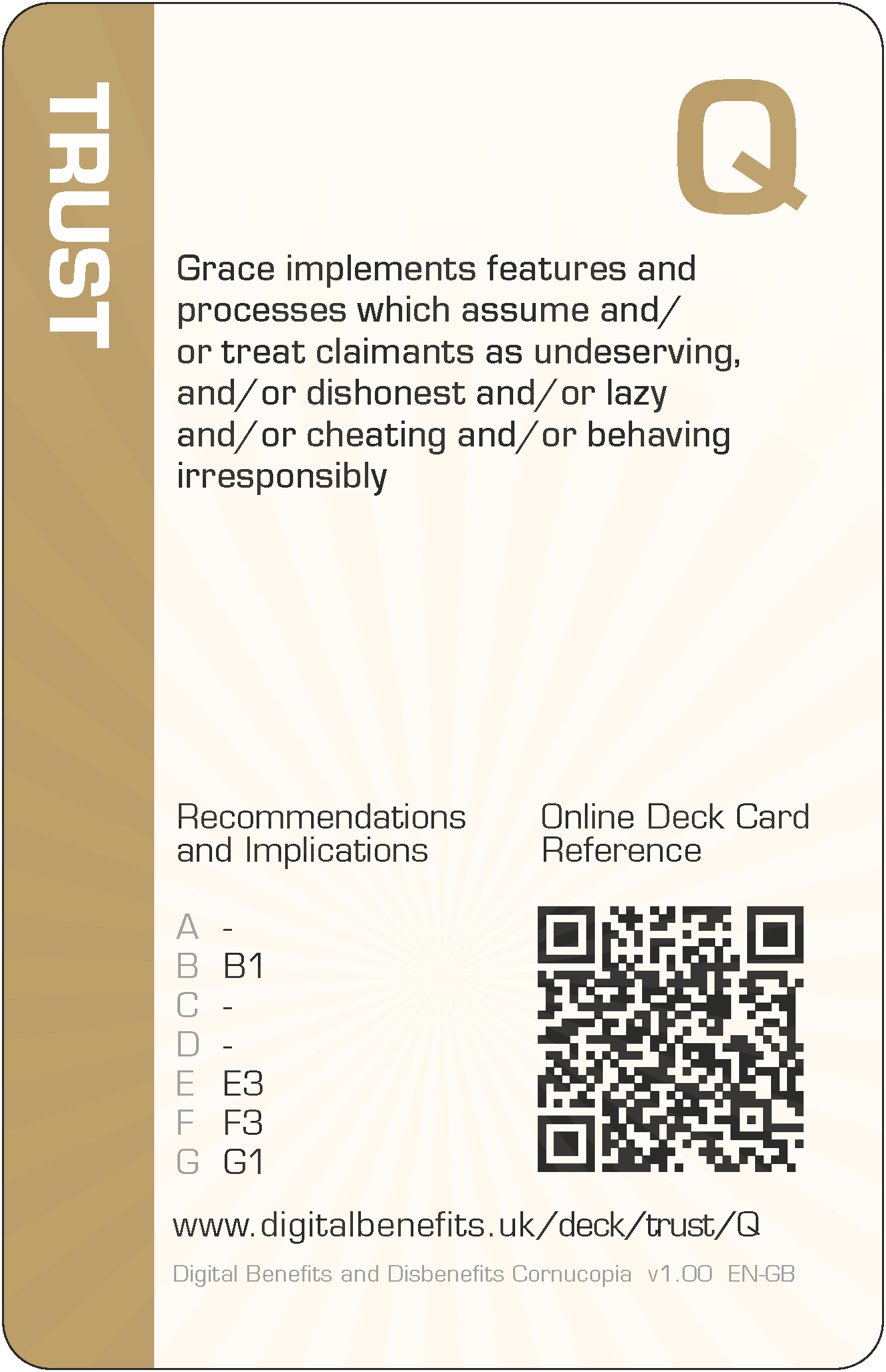Trust Q (TR-Q) Card
DBD Cornucopia > Deck > Trust > Q
Card Details - Queen of Trust
Abbreviation
TR-Q
Card's focus
The focus of this card is false assumptions
Threat to claimants
Grace implements features and processes which assume and/or treat claimants as undeserving, and/or dishonest and/or lazy and/or cheating and/or behaving irresponsibly

Threat to claimants
Grace implements features and processes which assume and/or treat claimants as undeserving, and/or dishonest and/or lazy and/or cheating and/or behaving irresponsibly.
Some examples of how this threat could lead to harms (negative effects on claimants)
The design recommendations and implications relevant to the card are listed below in the next section, but even those can be somewhat abstract and difficult to think about during practical day-to-day implementation. Therefore, some example harms are provided to complement the more formal research outputs. These examples are unique per card, and are only published on these web pages (i.e. in no other project outputs).
- Claimants feel undermined, decreasing their confidence, affecting both their work and home life
- Despite their best efforts, claimants are repeatedly treated unprofessionally, and lose belief in their own capabilities and their sense of self-efficacy
- Claimants try to counter biased negative stereotyping by increasing the amount of time and effort they put into monitoring notifications, responding to questions in messages, reporting data and preparing for interviews
- Errors are assumed to be fraud, even for first mistakes which were not intended, making claimants feel guilty, giving them heartache due to the threat of prosecution
- Negative pronouncements and narratives about people who claim welfare benefits being lazy or a burden on society, whether by politicians or government officials, leave claimants feeling shunned, fearful and anxious
- Ongoing requirements (conditions) to maintain an award are implemented un-necessarily awkward or difficult, feeling more like punishments to claimants than activities which could help them to improve their lives
- Threats of penalties are systematically built into standard processes, undermining claimants' efforts to secure better work
- Methods used to detect fraud against the state are highly invasive and disproportionate, requiring claimants to give up their privacy rights
The examples are to help understand the threat on the card, not to suppress thinking and innovation. Incorporating these examples exactly, or closely matching ones, should be scored down when playing DBD Cornucopia as a game.
Applicable design recommendations and implications
These are reproduced here from Research Briefing N
Acknowledge claimants as people in digital design
- Prioritise claimants' interests over system efficiencies
All digital welfare design processes, methods and decision-making should prioritise claimants' needs to achieve best outcomes for individuals rather than system efficiencies. Organisational knowledge and resources should be utilised to this respect including intervening in advance to identify matters that affect claims or what claimants may have forgotten about.
Design systems which support the division of labour with claimants' ecosystems
- Recognise changing trust effects in design of digital systems
Claimants have different opinions about the trustworthiness and motivations of the state, unfamiliar claimants and other actors, which affect their tolerance to accept harms, requiring flexibility in choosing assistance and recognition how this trust can change over time: prior to making a claim, while maintaining a claim, and after ceasing to be a claimant.
Design to assist claimants across the full span of their own activities
- Recognise and promote the synergistic effects wider ecosystems can offer claimants
Networks of actors and instruments contribute gains to claimants unrelated to the social protection payment public service, yet can contribute to improving people's lives. Ensure the integration of other actors is not purely transactional, but also provides opportunities to explore other beneficial aspects.
Signpost when additional assistance should be sought and recognise the time and effort needed to complete these activities
- Indicate to claimants when professional advice is crucial
Some activities undertaken to receive a social protection payment award require much more specialist knowledge and experience than most citizens have; such involvement can counter complexity to avoid becoming overwhelmed; increase visibility of when claimants should check whether advice can help by highlighting higher-risk parts of the process; avoid overly simplifying processes which can hide the underlying and necessary complexity of making and maintaining a claim and thus discourage seeking knowledge and experience in the wider ecosystem.
General Notes
Card values (i.e. 'Queen' for this card) are for game play and are not correlated with the severity of harm. This is because threats cannot be ranked directly since they can affect individuals in different ways due to situations and circumstances, or affect fewer or more claimants, or the harms can arise in claimants' support networks and wider society.
The threat description uses a person's name as the "attacker" (i.e. 'Grace' for this card), which can be thought of someone involved with implementation. They could have any role which influence digitisation. So they could be a database administrator, or a copy writer, or a quality assurance specialist, etc, or all of these. Everyone could have some influence on the claimant threat described. The names were randomly selected from those currently most popular as given names for boys and girls (UK Office for National Statistics).
The example harms provided are drawn from the research data (which explored not only parts of existing services but also the effects of possible changes to those), from the author's own knowledge of web application development and testing, the author's own experience of helping citizens to claim Universal Credit (UC) and Personal Independence Payment (PIP), and from suggestions submitted by other people (make a suggestion). The threats and example harms do not necessarily exist in the current UC or PIP deployments or in ecosystems around those services, but they might well do.
All the cards in this Trust suit are: 2 3 4 5 6 7 8 9 10 J Q K A
The other suits in the deck are: Scope, Architecture, Agency, Porosity and Cornucopia (plus Jokers).
